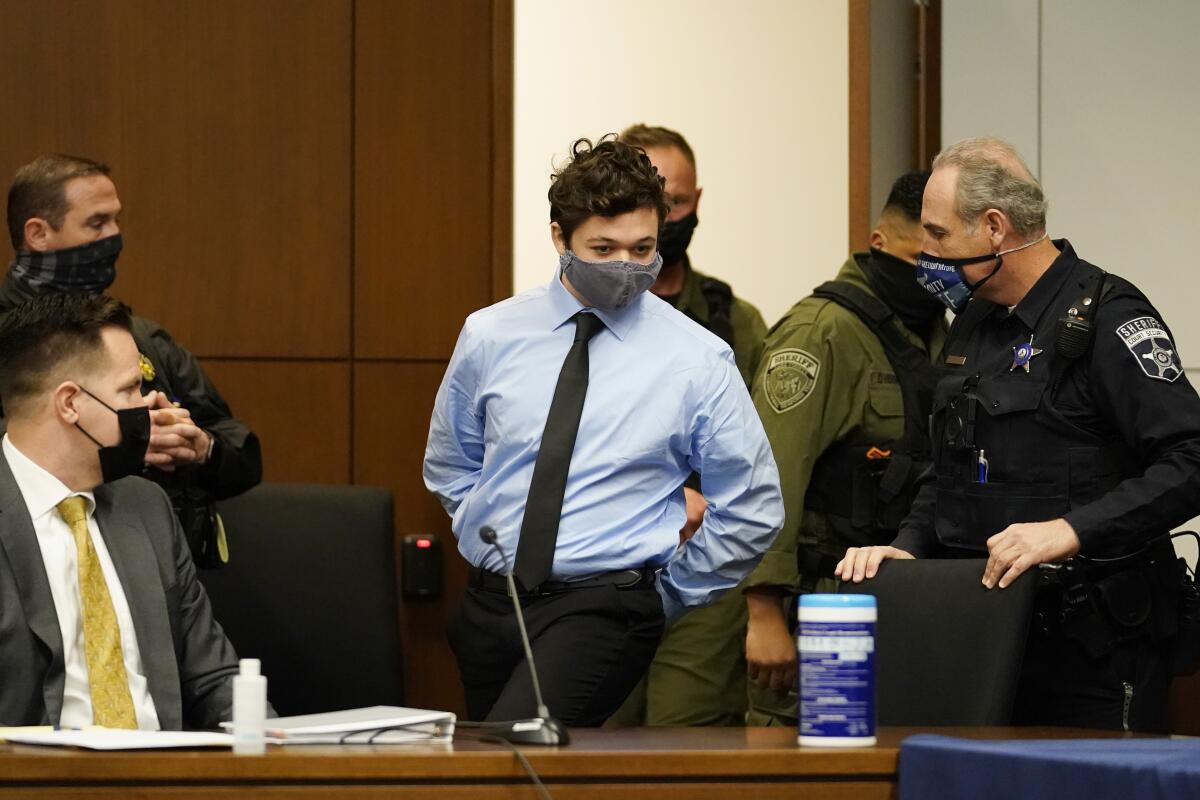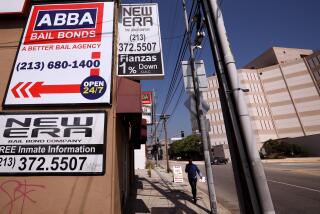Editorial: Kyle Rittenhouse’s ‘disappearance’ exposes the absurdity of cash bail

- Share via
Prosecutors reportedly want to rearrest Kyle Rittenhouse, who was a minor in August when he was charged with shooting two people to death and wounding a third in Kenosha, Wis., during violent protests over the police shooting of Jacob Blake. Prosecutors also want to raise his $2-million bail by $200,000.
The reason is that the Illinois teenager may have been living at an undisclosed location rather than the address he gave the court.
The news raises all sorts of worthy factual questions, like whether Rittenhouse, now 18, really was advised or even permitted by police to move into the unidentified “safe house,” as his attorney claims, and if he was, whether that justifies his failure to notify the court. And it would be interesting to know whether he received credible threats to his safety and whether officials in Kenosha, where he is being prosecuted, or Antioch, Ill., where he was supposedly living, are doing what is appropriate to keep him safe before trial, as they should for all defendants who are in danger.
But the flap also demonstrates yet another example of the folly of cash bail.
Criminal suspects are generally released pending trial, unless they are deemed dangerous to the public or high risks to flee. Posting bail with the court is supposed to guarantee their good behavior and their appearance at trial, ostensibly because people would rather get their money back than flout court orders or commit new crimes. But that’s fantasy — a story we tell ourselves to lull us into believing that we are balancing safety and justice.
Rittenhouse’s initial bail was set at $2 million. He didn’t have it, so he couldn’t pay it. The first-blush reaction might be: “Good! Killers should not be set free.” But of course Rittenhouse has not been convicted of anything at this point. Besides, the purpose of bail is to allow the accused to go home to prepare for trial, not to keep him locked up.
The utility of bail is even further diminished by the fact that Rittenhouse has become a symbol of sorts to the far-right, alt-right and white supremacy movements. Wealthy figures like former child actor Ricky Schroder and MyPillow Chief Executive Mike Lindell helped raise Rittenhouse’s bail money, undermining the already hazy notion that the defendant’s personal financial stake will affect his behavior.
So there’s also little apparent value in cranking up the bail amount by $200,000. Other sympathizers could just chip in the difference.
If the proper goal were to keep Rittenhouse in jail, then the correct response is not to set bail at a level he can’t afford. The proper response is not to release him for any amount of money, regardless of politics, wealth or the popularity of his supposed cause. The only valid reasons to keep him in jail, though, would be that he poses a credible risk to run or to harm others.
That risk has to be calculated based on the facts of the case and of the particular defendant. Validated assessment algorithms can be used to help weigh those risks, but they are decried by some justice advocates as tools that could be misused to perpetuate racial or poverty-based injustices. That argument helped persuade California voters last year to reject Proposition 25, sinking state legislation to finally eliminate money bail.
But those risk assessment tools can and should be constantly refined to improve their accuracy and their even-handedness. Without them, we in this state and most others are left with a system that sends people home or keeps them in jail depending on their personal wealth, or someone else’s. A justice system simply can’t get much more discriminatory than that.
A pretrial system that is properly criticized for disparate treatment of poor Black and Latino defendants also has to work for white defendants who, like Rittenhouse, have been embraced by white supremacists. And in either case it has to work for the public, which deserves to be protected from people who would cause harm. Any legal system worth its salt must demonstrate that it works equally and effectively in delivering justice regardless of wealth or poverty.
More to Read
A cure for the common opinion
Get thought-provoking perspectives with our weekly newsletter.
You may occasionally receive promotional content from the Los Angeles Times.










